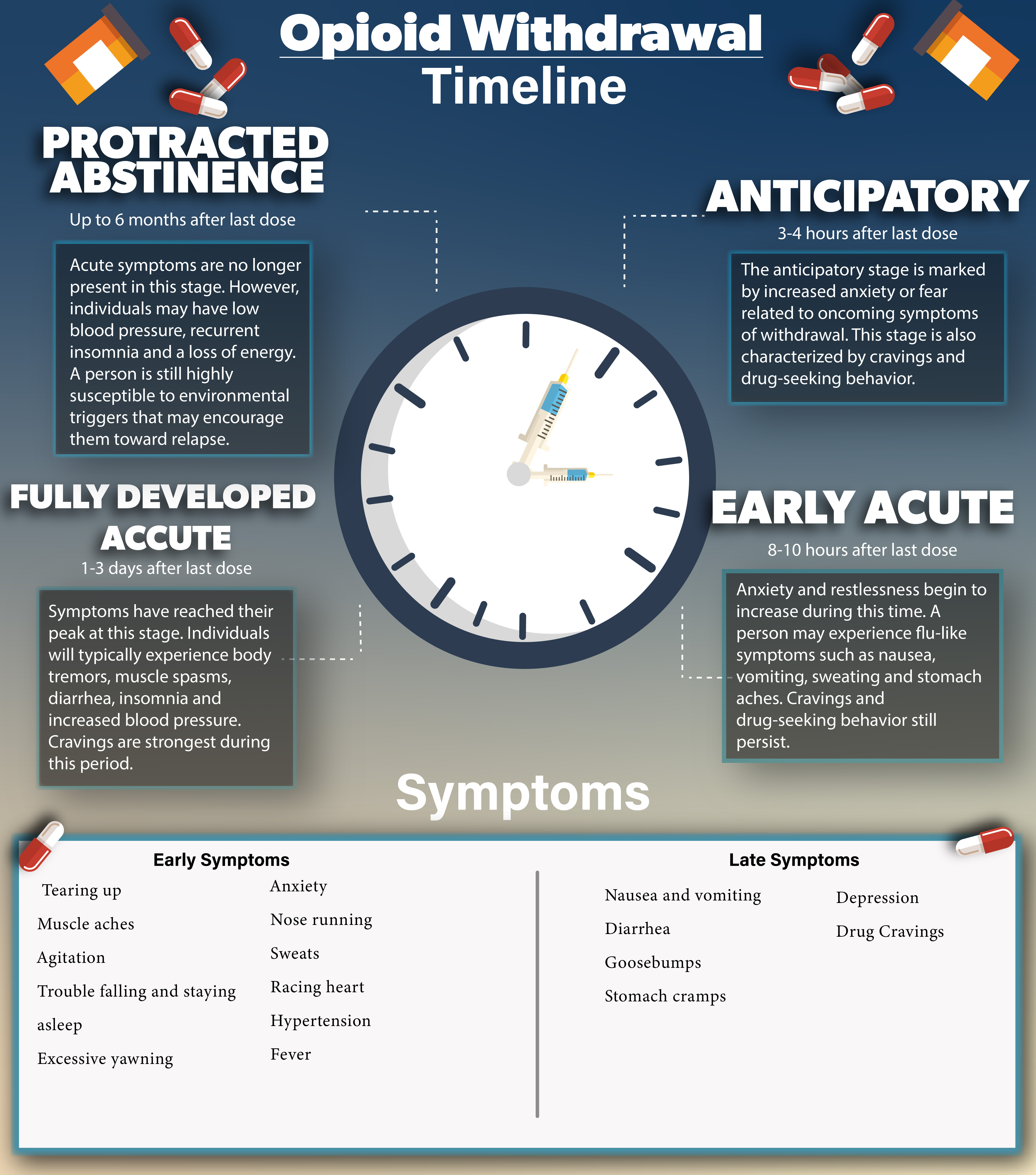- Table of Contents
- Overview
- Testimonials
- Benzo and Barbs (Anxiety)
- Stimulants
- Resources
- Additional Drugs
- Get Help Today
What are withdrawals?
Withdrawals are the uncomfortable symptoms that happen when an individual stops ingesting a drug they are physically dependent on. Over time, when a person uses a substance frequently and regularly they start to form a dependence towards the drug. Drugs and alcohol have a variety of effects on our brain and body; one of them being the release of neurotransmitters. When people ingest any drug like alcohol or even caffeine, it causes a release of neurotransmitters that make us feel happy, focused, relaxed, etc. When these substances are ingested frequently, the body adapts to the influx of chemical firing and in turn, produces less of its own. When the substances cease, these neurotransmitters become very low causing withdrawal symptoms.
Withdrawal symptoms vary by drug and from one person to the next. This article will cover the basics of what to expect and look for during potential withdrawals. Depending on the drug, withdrawals can be extremely uncomfortable and possibly fatal. Always consult your doctor or psychiatrist before quitting substances on your own. Detox services are available to properly and safely administer appropriate care during alcohol and drug withdrawals.
Withdrawals can vary from person to person. Factors the influence these symptoms include:
- Whether or not a combination of drugs were used
- The individual’s metabolism rate
- Body mass and weight
- Body fat content
- The overall health of the person (especially the liver and kidneys)
- Age
- Genetics
- How often and how heavy the use is
- Quality of the drug
- Amount of water in the body
Codeine, Heroin, Hydrocodone (Vicodin), Hydromorphone (Dilaudid), Methadone, Meperidine (Demerol), Morphine (MS Contin, Kadian), Oxycodone (Percocet or Oxycontin)
If you are reading this article, you know that opiate withdrawal can be a strong obstacle in overcoming addiction. Opiates leave a body’s system within 2 days; after withdrawal symptoms begin. Opioid withdrawals are extremely uncomfortable but unlike alcohol and benzodiazepines, withdrawals from opiates alone are not fatal. When combined with other drugs like alcohol, withdrawal symptoms can lead to life-threatening seizures.

Opioid Withdrawal Management
To find out exactly what your withdrawal symptoms will look like, consult your doctor or a psychiatrist before discontinuing opiate usage. A professional doctor will be able to provide you with specific information on what to expect. They may recommend a detox program; at least for the first week; to safely and comfortable wean off of the opiate.
Anxiety Medication Withdrawals
Valium (diazepam), Ativan (lorazepam), Klonopin (clonazepam), and Xanax (alprazolam)
Benzodiazepines, or “benzos,” are central nervous system depressants commonly prescribed to manage a variety of conditions, including anxiety, panic disorders, muscle spasm, seizures, alcohol withdrawal, and insomnia and in some cases alcohol. Benzos have largely replaced barbiturates in recent years.
The severity of benzo withdrawals depends on the average dose being previously taken and how suddenly they are stopped. When users abruptly quit benzodiazepines after a sustained period of time, they increase their risk of severe withdrawal symptoms.
Benzodiazepine Withdrawal Symptoms
- Anxiety
- Sweating
- Panic
- Insomnia
- Irritability
- Poor concentration
- Heart palpitations
- Agitation
- Nausea
- High blood pressure
- Headaches
- Tremors
- Muscle pain and stiffness
- Sensory distortions
Benzodiazepine Withdrawal Management
The withdrawals from Benzodiazepines can be dangerous, especially for users with severe dependence and those with pre-existing health issues. Serious benzo withdrawal symptoms can include psychosis and seizures. Left unmanaged, withdrawal seizures could progress, be difficult to control, and potentially lethal.
Due to the potentially dangerous effects, quitting benzodiazepine use should always be done with medical supervision. Often time a slow taper method is administered over the course of a couple weeks or months: depending on the severity of use. Medications Used for Benzo Withdrawals
Secobarbital (Seconal), Amobarbital (Amytal), Butalbital (Fiorinal, Fioricet), Pentobarbital (Nembutal), Amobarbital (Amytal), Phenobarbital (Lunial), Methohexital (Brevital)
Barbituates are commonly prescribed to help with anxiety and sleep disorders. They are labeled under the class of drugs known as sedative-hypnotics. The use of barbiturates has declined since the 1970s as Benzodiazepine have largely replaced barbiturates in the medical profession. Barbituates are also extremely dangerous and withdrawing from the drug can potentially be life-threatening.
Barbiturate Withdrawal Symptoms
Withdrawals typically begin with tremors, difficulty sleeping, and agitation and can lead to including hallucinations, high temperature, and seizures.
- Irritability
- Sleeplessness
- Restlessness
- Seizures
- Tremors
- Hallucinations
- Fever
- Sweating
- Delirium
- Cardiovascular collapse
- Severe anxiety
- Hypotension
- Mood disorders
- Death
Barbiturate Withdrawal Management
Detoxing from barbiturates cannot be done alone or at home. Seek medical help if you have used barbituates for an extended period of time and wish to quit. Inpatient detox facilities are available near you. If you need help finding a detox, call Coalition Recovery (888) 707-2873 and speak with one of our addiction specialists. Let us find a reputable inpatient detox near you! Medications used for Barbituate Withdrawals
Stimulant Withdrawals
Methamphetamine withdrawals occur immediately after someone discontinues taking methamphetamine or crystal meth. Symptoms can surface as soon as 24 hours. With methamphetamines, the most intense symptoms happen during the first 24 hours and gradually wear off over the next few weeks. Symptoms can be both physical and psychological where the physical symptoms generally wear off within a couple of days.
Methamphetamine Withdrawal Symptoms
- fatigue
- agitation
- insomnia
- hypersomnia
- meth cravings
- red, itchy eyes
- dysphoric mood
- suicidal thoughts
- increased appetite
- mild to severe paranoia
- psychomotor impairment
- vivid, unpleasant dreams
Methamphetamine Withdrawal Management
Detoxing from meth, while uncomfortable, can be done without medical assistance. Due to potential psychosis, the first day of detox should be done with another person for support. Detox can be helpful in providing medication and support during the first couple of days. Detox can help the process go by more smoothly but is not entirely necessary. Medications Used for Methamphetamine Withdrawals
16 million Americans over the age of 18 are using prescription stimulants. Adderall withdrawal is relatively common. Adderall withdrawals are essentially the opposite of its effects.
Adderall Withdrawal Symptoms
- Depression
- Anxiety
- Difficulty concentrating
- Irritability
- Suicidal thoughts
- Headaches
- Nightmares
- Oversleeping
- Increased appetite
- Insomnia
- Achiness
- Fatigue
Adderall Withdrawal Management
To properly detox from Adderall it is important to consult your doctor/psychiatrist. He or she will taper your medication down over the course of a couple of weeks or months. Depending on your prescription and your history, the effects of Adderall may be lost over time. Individuals may experience a lack of concentration, fatigue, and depression. Talk to your doctor to discuss your options. Medications used for Adderall Withdrawal
Addiction Resources
Other Substances
Marijuana dependence is mainly psychological, meaning much of the withdrawal symptoms associated are mental. Marijuana, unlike other commonly abused substances, is relatively safe to withdrawal from and can be done by oneself; but that is not to say the withdrawal process is easy.
Marijuana Withdrawal Symptoms
- diminished appetite
- mood changes
- irritability
- sleep difficulties, including insomnia
- headaches
- loss of focus
- cravings for marijuana
- sweating, including cold sweats
- chills
- increased feelings of depression
- stomach problems
Marijuana Withdrawal Management
If deciding to stop smoking marijuana, consult your local physician first. Unlike many other substances, detoxing from marijuana is relatively safe, but talking to a clinician can be helpful for gaining some suggestions and advice.
Depending on how much an individual smokes, it could be a good idea to taper off before quitting completely. This can lower the withdrawal effects associated. If a person only smokes occasionally, the withdrawal symptoms will be minor to non-existent.
When quitting marijuana, individuals will not need a detox, but they can lessen their withdrawal symptoms by keeping the body running at its peak performance. Do things like:
- Staying hydrated and drinking more water than usual.
- Eat healthily and try to ingest foods rich in nutrients and antioxidants.
- Exercise. Staying active can help boost mood and counteract many of the withdrawal symptoms of marijuana.
- Sweat. Exercising helps, but sweating in a sauna can help the body detox naturally from the THC in the system and can alleviate symptoms sooner.
While quitting from marijuana may not be life-threatening, the withdrawal symptoms and cravings can be very intense making it extremely difficult to detox alone. Because much of marijuana addiction and dependence is psychological it is important to find a support system that can hold accountability.
sertraline (Zoloft), fluoxetine (Prozac, Sarafem), citalopram (Celexa), escitalopram (Lexapro), paroxetine (Paxil, Pexeva, Brisdelle), fluvoxamine (Luvox)
desvenlafaxine (Pristiq, Khedezla), duloxetine (Cymbalta), levomilnacipran (Fetzima), venlafaxine (Effexor XR)
Individuals should never quit their anti-depressant medication “cold turkey.” The purpose of these drugs is to restore the chemical balance back to the brain that was irregular during the depressive state. Individuals who have been on anti-depressant medication for over a year can have intense withdrawal symptoms. These symptoms, although very unpleasant, are not fatal but always consult your doctor before quitting the medication. Often times they will administer a taper and wean the medication off safe and slow. Due to the taper method of detox, the process typically takes longer than a standard detox from alcohol or opioids: from 1 week to two months. When detoxing at a rehab facility or detox center, your doctor continually monitors your health and progress.
Antidepressant Withdrawal Symptoms
- Fever
- Headaches
- Diarrhea
- Dizziness
- Vivid dreams
- Nausea
- Confusion
- Panic attacks
- Lightheadedness
- Tremors
- Anxiety
- Hallucinations
- Suicidal thoughts
More often then not, we typically deal with multiple substances. Often times alcohol and marijuana are secondary substances used to help either increase highs or balance adverse effects. The withdrawals from multiple substances can increase the difficulty in dealing with withdrawal symptoms. When dealing with the detoxification and recovery process, due to the complications of multiple drug effects, it should be left up to medical professionals on how to proceed. Users of multiple drugs are encouraged to look to medical detox institutions for advice and assistance rather than trying to deal with these matters on their own as this could potentially be life-threatening.







